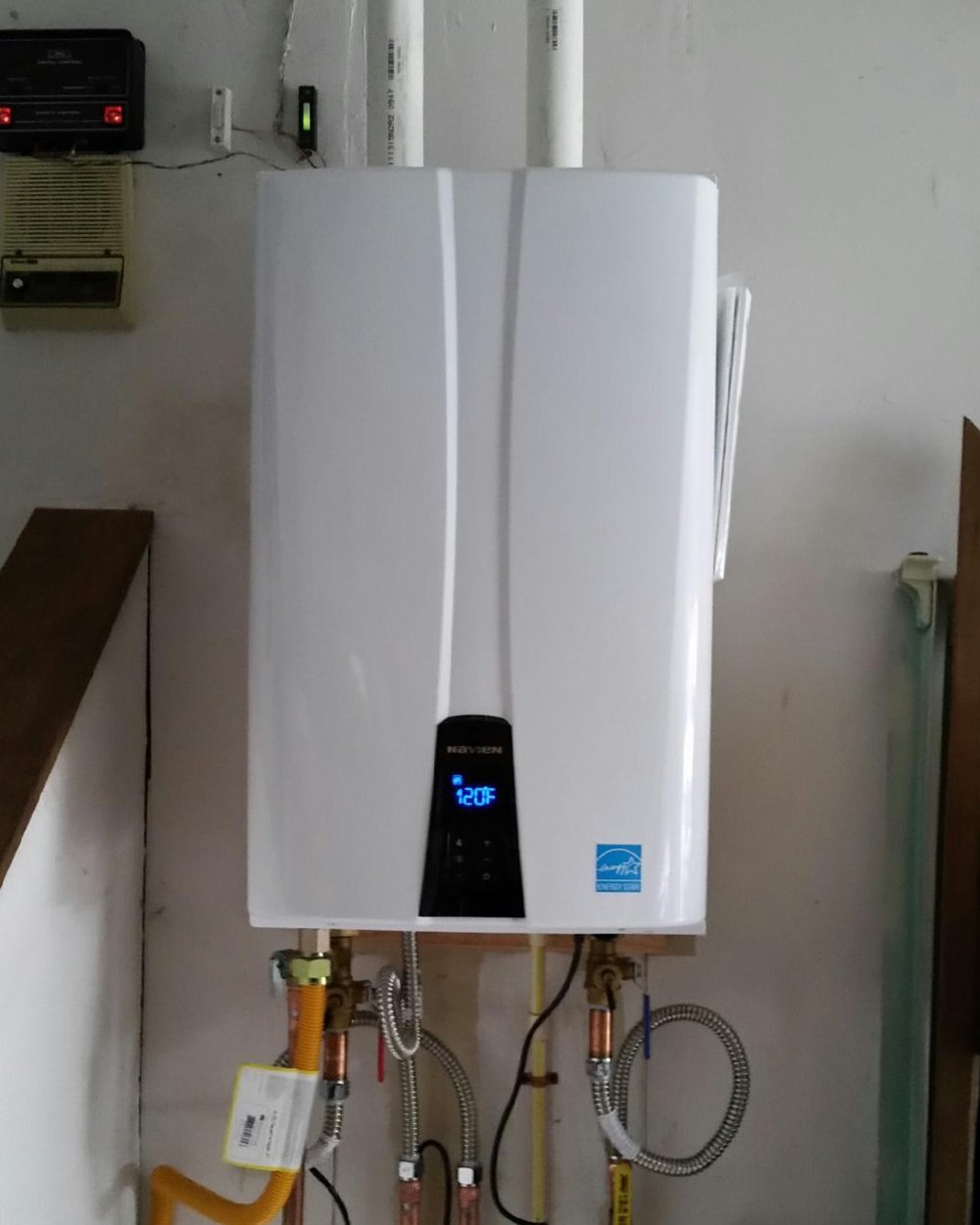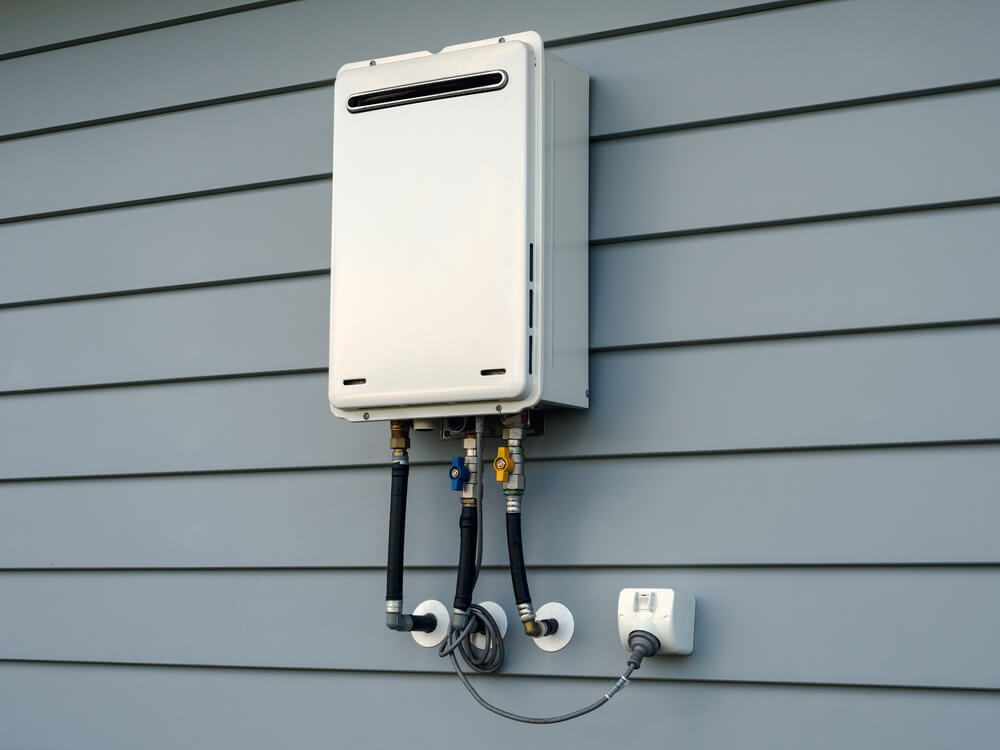Notable Gains Of Selecting Tankless Water Heaters
Notable Gains Of Selecting Tankless Water Heaters
Blog Article
This article which follows in relation to 5 Benefits of Tankless Water Heaters is relatively stimulating. Don't miss it.

In a globe where ease and performance reign supreme, it's no surprise that homeowners are constantly on the lookout for smarter ways to manage their home's power intake and convenience. One development that has actually steadily obtained popularity is the tankless water heater. Yet exactly what makes these systems stand apart from the standard tank-based designs most of us grew up with? Let's dive in and explore the advantages of tankless water heaters, assisting you determine if it's time to make the button in your house.
Introduction
Image this: you enter the shower after a long day, anticipating a calming cascade of hot water, only to be welcomed by icy beads due to the fact that the last person used it all up. Noise acquainted? Typical water heaters save a fixed amount of warm water, implying you go to the mercy of that storage tank's supply. Tankless systems, on the other hand, heat water as needed. No more going out mid-shower, no more wrestling with routines simply to ensure hot water is readily available.
Recognizing Tankless Hot Water Heater
What Are Tankless Water Heaters?
Tankless water heaters, occasionally referred to as on-demand or instant hot water heater, supply hot water only as it's needed. As opposed to storing gallons of pre-heated water, these systems kick into activity the minute you turn on the tap. Water passes through a heat exchanger, warming up in real-time, meaning you get an undisturbed circulation of hot water without the demand for a big storage tank sitting idly by.
How Do They Differ from Typical Systems?
Conventional heating systems hold a tank of warm water, utilizing power to maintain that storage tank at a consistent temperature. Tankless units get rid of the standing supply, reducing squandered power and the bulky impact of a big cyndrical tube. Basically, you're upgrading from a "stockpile" mindset to a "made-to-order" approach.
Typical Sorts Of Tankless Units
Tankless water heaters normally are available in 2 ranges: gas and electrical. Gas designs often tend to provide higher flow prices, perfect for larger households, while electric models typically serve smaller sized homes and are normally less complicated to install. In addition, some systems are made for point-of-use (offering one fixture) while others can take care of the entire home's hot water requirements.
Secret Benefits of Tankless Hot Water Heater
Power Performance and Cost Financial Savings
No more heating up a titan container's well worth of water and keeping it toasty throughout the day. Tankless heaters reduce standby energy losses, which can decrease utility bills. While the first cost may be greater, the lasting cost savings often validate the investment.
3. Space-Saving Style
If your home is short on storage space, removing the cumbersome tank liberates useful space. Tankless systems are small and can often be mounted on walls, stashed in edges, or set up in tight utility closets without grabbing all of the whole space.
4. Longer Lifespan
A properly maintained tankless water heater can outlast its tank-based cousin. Typical storage tanks may last 10-15 years, while tankless versions can maintain chugging along for two decades or even more, making them a solid financial investment with time.
1. Endless Warm Water Supply
Ever needed to schedule showers so every person gets their fair share of hot water? With tankless, that comes to be a thing of the past. As long as the heating system's circulation ability isn't exceeded, you can take back-to-back showers without developing into a popsicle.
5. Improved Water Top Quality
Keeping water in a storage tank can sometimes cause debris accumulation or a somewhat "off" preference. With tankless systems, fresh water is warmed on the spot, lowering the opportunities of debris accumulation and potentially using cleaner-tasting water.
Factors to consider Before Changing
Though the benefits are engaging, it's important to take into consideration a couple of aspects before fully committing.
Examining Your Home's Water Use Patterns
If your home concurrently utilizes multiple components with high hot water need, see to it the device's circulation price meets your needs. Knowing your usage patterns helps you select the best size and type of tankless heating unit.
Maintenance and Care Tips
Tankless systems are fairly reduced upkeep, yet they aren't set-it-and-forget-it home appliances.
Regular Cleaning and Descaling
Tough water minerals can build up in the heat exchanger, impacting effectiveness. Routine descaling (usually advised annually) keeps the system running at peak performance.
Yearly Professional Examinations
A yearly checkup from a professional makes certain minor problems are captured early. They'll assess the device's performance, search for leaks, and assist keep optimum effectiveness.
First Investment Costs
Tankless heating systems generally include a higher ahead of time price tag. In between the unit itself and prospective installation alterations, the first price may offer you sticker shock. However remember to watch it as a long-lasting investment.
Setup Needs
Relying on your home's facilities, you could need added electrical ability or gas line upgrades. Guarantee you comprehend the installation demands and speak with a specialist to prevent shocks.
Making Certain Proper Air Flow
For gas models, proper air flow is essential to safely expel exhaust gases. Make certain airing vent systems are clean and properly installed to stop any type of potential safety threats.
Comparing Different Brands and Designs
Not all tankless hot water heater are developed equivalent.
Researching Dependable Suppliers
Look for trustworthy brand names with a background of creating high quality units. A dependable producer usually supplies better client assistance and longer guarantees.
Installment: DIY or Specialist?
While some home owners enjoy taking on tasks themselves, tankless setup might not be the very best time to burst out the tool kit.
Pros and Cons of DIY Installment
A do it yourself install might conserve money, however it comes with risks. Incorrect setup can bring about ineffectiveness or safety and security issues. If you're handy and have experience, it may be feasible-- however wage care.
Reading Reviews and Customer Comments
Customer reviews and feedback from next-door neighbors or pals that have actually gone tankless can use useful insights. Sometimes, real-life experiences can be extra informing than advertising brochures.
When to Call a Specialist Plumbing Technician
For a lot of, calling a pro ensures everything's done appropriately. A professional plumbing professional understands regional codes, sizing requirements, and venting criteria, minimizing the threat of problems.
Maximizing Effectiveness
You have actually invested in a tankless unit-- now optimize its performance.
Optimum Temperature Settings
The majority of people establish their devices in between 120-140 F. Changing the temperature can enhance convenience and cost savings. Experiment to discover a sweet place that does not squander power.
Pairing with Low-Flow Fixtures
Intend to extend your unit's capabilities? Consider mounting low-flow showerheads and taps. They lower water use, allowing your tankless system to provide a stable stream of warm water without stressing.
Ecological Effect
Tankless hot water heater straighten with greener living goals.
Decreased Carbon Impact
By utilizing much less energy and just heating water as required, tankless systems can decrease your home's carbon footprint, reducing your environmental impact.
Saving Natural Resources
Much less power consumption and much less thrown away warm water convert right into fewer natural resources being made use of, an environmental win-win.
That Profits Most from Tankless Heating units?
The elegance of tankless heaters is that they can suit a variety of homes.
Big Households vs. Single Residents
Large households may enjoy the endless warm water supply, while solitary passengers appreciate the energy financial savings from not warming a whole storage tank for just someone's morning shower.
Property Owners with Minimal Area
If your home is short on square video footage, losing the cumbersome storage tank frees up room for various other fundamentals-- or possibly just extra elbow room.
Eco-Conscious Consumers
Going tankless aligns with eco-friendly values, ensuring you're not losing power or resources.
Future Fads in Tankless Hot Water Heater
The world of home devices is ever-evolving, and tankless water heaters are no exception.
Innovations in Technology
R&D is continuously improving warmth exchangers, making units extra effective and resilient. Future designs might be also quieter, much more portable, and better fit for differing environments.
Smart Home Assimilation
Think of changing your hot water heater's temperature level using an application or getting upkeep informs on your phone. As smart home tech developments, we'll see more connectivity and convenience.
Verdict
Picking a tankless water heater is more than simply upgrading your home's hot water system; it's investing in long-lasting convenience, energy effectiveness, and a greener lifestyle. By considering your household's water usage, bearing in mind installation needs, and dedicating to routine maintenance, you can appreciate a consistent stream of warm water without the baggage of a cumbersome tank. As technology progresses, you can look forward to even smarter, extra efficient tankless remedies that not just make your life much easier yet also profit the planet.
Pros and Cons of Tankless Water Heaters
Tankless Water Heater Pros
Saves Energy: Simply put, you re spending less energy to create hot water, so your total carbon footprint goes down, not to mention your bills. Lasts Longer Than Storage Tanks: Storage tank units need to be replaced every 15 years or so. But tankless units? They can last for 30 years before they give out on you. Constant Hot Water: Need to take a shower and don t want the water running cold? Awesome it won t. The water will stay hot the entire time because it creates hot water on demand. Saves You Money: Less water usage equals less money. Beyond that, you re not paying to keep water hot 24/7. Those savings add up quickly. Better for the Environment: Less water waste is better for everyone. It saves you money, but it s also environmentally conscious at the same time. Tankless Water Heater Cons
It Can Take a Minute: Depending on your specific unit and its placement, it can take anywhere from 10 seconds to 2 minutes to fully heat up. Because there s no storage tank, it heats water as you need it. Upfront Purchase Price: While we talked about their longevity, there s sticker shock when you look at brand-new tankless units to install. It pays for itself, but it s still a big chunk of change at first. Has its Limits: If you run multiple appliances at once, such as the dishwasher, washing machine, and maybe you take a shower at the same time, there might not be enough hot water. https://www.airsouthnow.com/blog/water-heater-service/pros-and-cons-of-tankless-water-heaters/

I'm certainly very focused on Unveiling the Hot Trend: The Benefits of Tankless Water and I'm hoping you appreciated the entire article. Liked our article? Please quickly share it. Help other people discover it. Thanks a lot for taking the time to read it.
Call Today Report this page